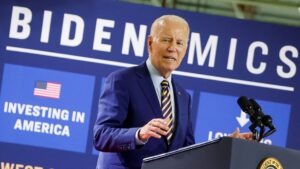Analyzing the Legacy of Biden’s Presidency: Economic Triumphs Clouded by Inflation
As we approach a significant political transition in the United States, it becomes crucial to reflect on the economic landscape shaped during President Joe Biden’s administration. While the surface might suggest a robust economic recovery, many underlying issues, particularly inflation, have left a lasting impact on the public mindset. Here at Extreme Investor Network, we believe in diving deep into these numbers and narratives to better equip our readers with valuable insights into the state of our economy.
A Promising Economic Recovery
On the surface, Biden’s presidency might appear to reflect a success story of economic revival. With steady job creation, an upward trend in Gross Domestic Product (GDP), and consumers still actively spending, one can argue that the economy is on solid ground. After all, the unemployment rate has significantly decreased and certain sectors, particularly tech, have boomed since the pandemic’s grip began to loosen.
However, this recovery is shadowed by a persistent issue: inflation. Despite the positive narrative, inflation continues to be the predominant concern for consumers, especially those on the lower end of the income spectrum. According to recent data, inflation peaked at a staggering 9% in June 2022, prompting a rise in cost-of-living expenses for average households. This financial strain has overshadowed the gains made during Biden’s tenure.
Understanding the Inflation Phenomenon
The troubling reality is that inflation rates during Biden’s terms are considerably higher than during Trump’s presidency, with an increase of approximately 21% versus 8% from 2017 to 2021. Even with healthy economic growth of around 3% annually, the specter of inflation looms large, distorting public perception of Biden’s economic management.
Why is inflation so problematic? It’s not just about prices rising; it’s about how these rising costs outpace wage growth. Despite a reported 19% increase in average hourly earnings under Biden, wages have still struggled to keep up with inflation. This gap plays a significant role in consumer sentiment, which has dropped 6% according to the University of Michigan sentiment survey since the start of Biden’s term.
A Complex Economic Landscape
Even though various indicators, including household net worth, retail sales, and stock market performance, show significant growth, the benefits of this wealth surge are not equitably shared. The wealth gap persists, with the top 1% controlling nearly 50% of stock market wealth, leaving the bottom half of earners with just 1%. This disparity reflects a critical aspect of economic recovery: not all groups benefit equally.
Moreover, while household net worth has surged to over $169 trillion, primarily driven by gains in the stock market and real estate, the dream of homeownership has become increasingly elusive. Rising mortgage rates, now exceeding 7%, juxtaposed with climbing home prices have made homeownership a distant goal for many Americans.
Contributing Factors: Supply and Demand Dynamics
Biden’s approach to post-COVID recovery included significant fiscal and monetary stimulus measures, such as the $1.9 trillion American Rescue Plan, which infamously added to inflationary pressures. Economic experts point to the supply-demand imbalances initiated by the pandemic, exacerbated by aggressive financial stimuli in an already recovering market. This interplay of factors contributes to the inflation that continues to vex economists and consumers alike.
The Challenges Ahead
Transitioning towards the future, the U.S. faces a complex economic challenge. As Biden prepares to exit the White House, the burden of a $36.2 trillion debt and ballooning deficit will be passed on to future generations. With a federal deficit projected to hit $1.8 trillion in 2024, the fiscal policy’s sustainability is in serious question.
Economists often draw parallels between economic growth and inflation, hinting at the possibility that the U.S. might eventually be judged on how well it navigated these turbulent waters. Jerome Powell, the chair of the Federal Reserve, has acknowledged the resilience of the U.S. economy compared to global counterparts but recognizes the potential dangers ahead with current monetary policies.
Conclusion: Looking Beyond the Surface
As President Biden leaves office, the narrative of economic success is complicated by the specter of inflation and its deep-seated effects on the American populace. As history unfolds, the economic strategies employed and their long-term repercussions will be scrutinized. At Extreme Investor Network, we are committed to providing timely insights and analyses to help you navigate these economic realities and prepare for what lies ahead. We encourage our readers to stay informed, as every economic shift can offer both challenges and opportunities for savvy investors.
Stay tuned for more insights and detailed analysis as we continue to explore the dynamic world of finance and economy!

